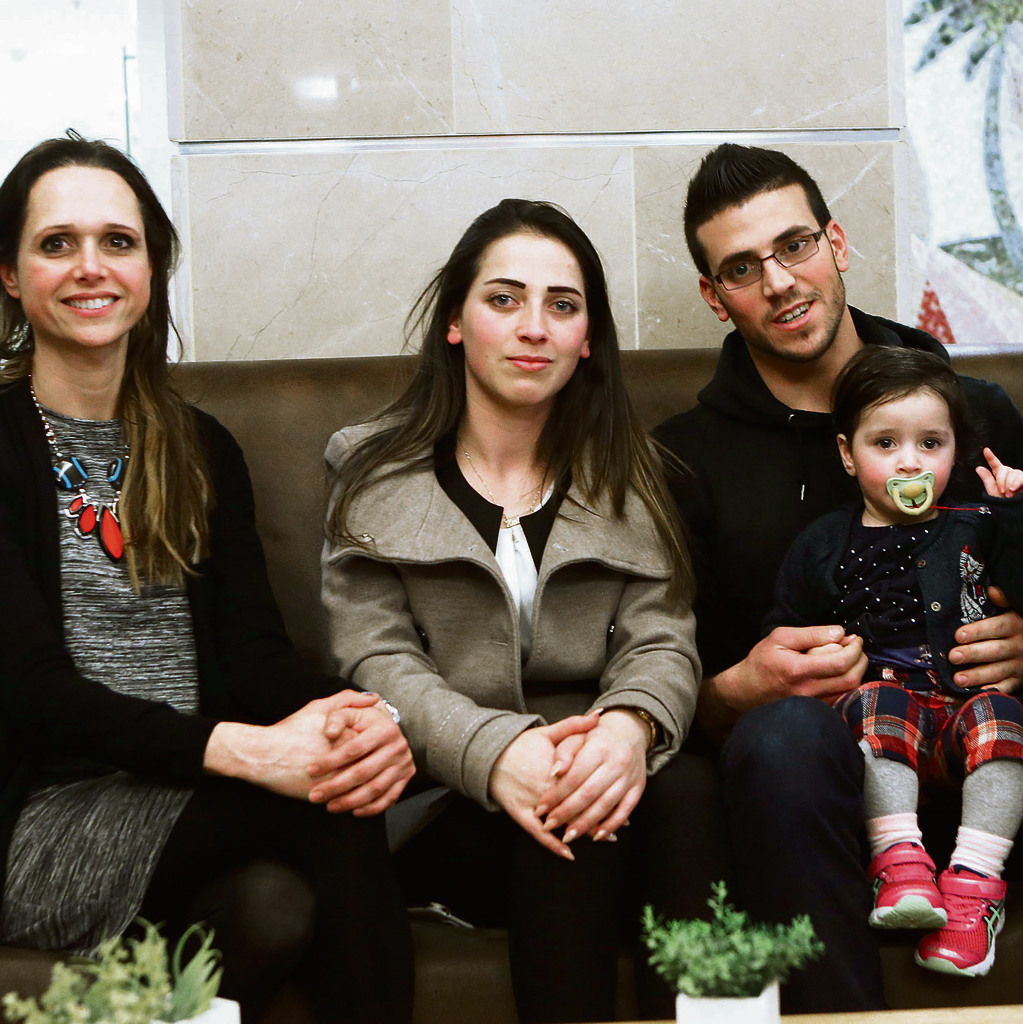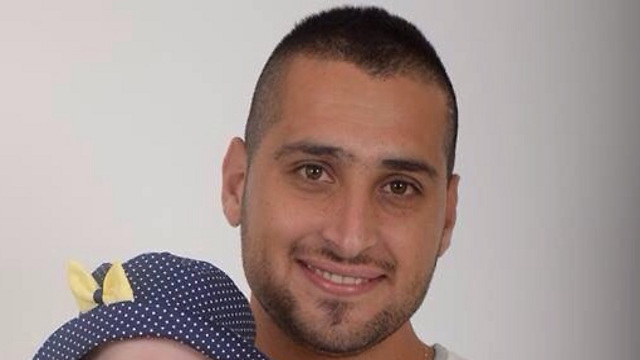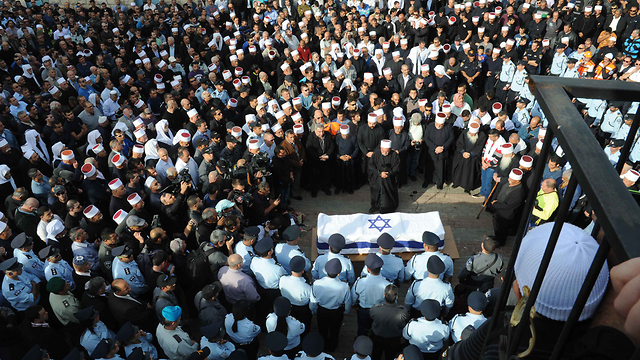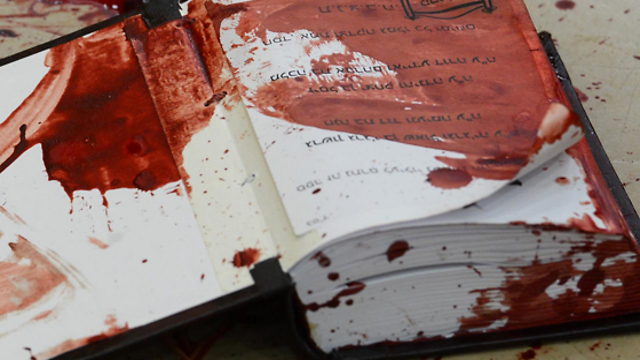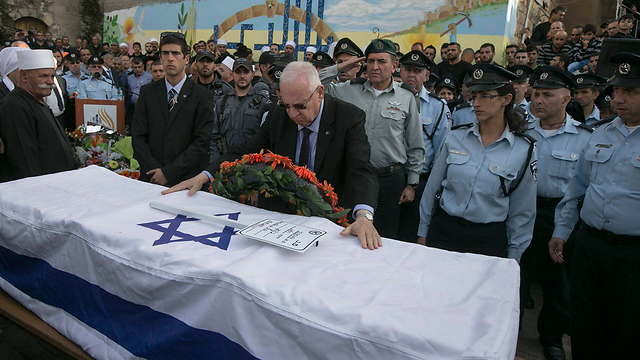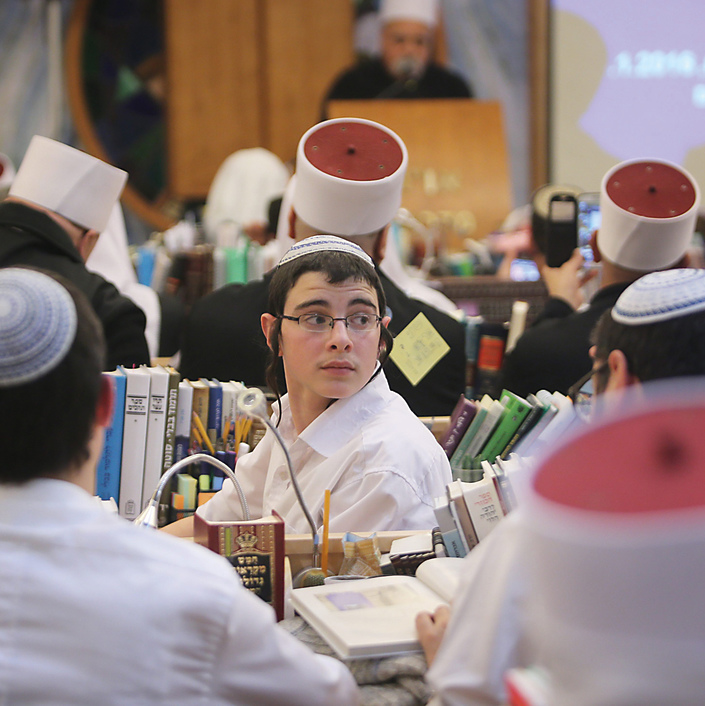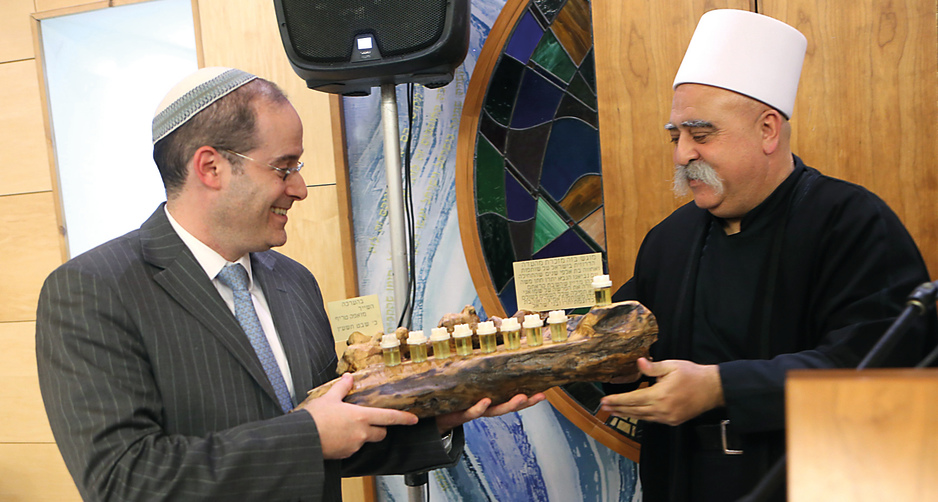
Druze and Jews forge special bond in memory of brave policeman
After visiting the family of Zidan Seif, the brave Druze policeman who stopped the massacre at the Har Nof synagogue, giving his life for Jewish worshipers, Rabbi Yaakov Kermaier saw an opportunity to bring Jews and Druze together for Jethro’s Shabbat, when the story of Moses’ father-in-law, and the founder of the Druze religion, is told.
"I didn't go to parties, I didn't wear makeup. I mourned. I went back to live with my parents and they're helping me raise our baby daughter," Rinal says, sitting at the Shabbat table at the Nissim family home, in Jerusalem's Arnona neighborhood.
Both pain and light radiate from Rinal's face, an impossible contradiction - as impossible as calling a young, beautiful 23-year-old woman, whose deep blue eyes burn with noble determination, a "widow."
"The Druze customs allow each person to determine how long they want to mourn. There are those that after 40 days end the mourning period. It took me a long time, but after a year and one month, I realized I wanted to get back to living life, for him, for Zidan, and for our daughter. Zidan gave his life for other people's lives, and I want to continue this life. I do everything in honor of Zidan."
"At our Shabbat table, it is custom to read from the Torah," says Yonatan Nissim, who is hosting Rinal, her brother and her daughter in his home. "Today we don't need to say anything. The things you're saying, Rinal, are stronger than any quote from the Torah. There's no need for words."
But the Nissim family is not the only one hosting this Shabbat, in dozens of other Jerusalemite homes, Druze and Jews are sitting side by side at the Shabbat table. Three buses brought some 160 people from four Druze villages in the Galilee to the Shai Agnon synagogue in Arnona on Saturday afternoon. Sheikhs with elegant mustaches and tarbooshes, elderly women whose heads are covered by thin white shawls, young people, teenage girls, and children, all get off the bus one after the other, shaking the hands of their hosts with embarrassed hesitation. Their hosts were waiting for them outside the synagogue with flags combining the Israeli and Druze flags, made by the meeting's organizer, Rabbi Yaakov Kermaier.
"When the terror attack at the Har Nof synagogue happened, I was in Israel. It wasn't a regular visit to Israel, it was a visit to prepare for our aliyah," says Kermaier, 46, who at the time served as the rabbi of the Ateret Tzvi community at the Fifth Avenue Synagogue in Manhattan. "Since I knew the family of one of those murdered in the attack, I went to offer my condolences at the shiva in Har Nof. It was there, of all places, that I suddenly asked myself why I wasn’t going to offer my condolences to the Seif family as well. I made inquiries on whether the family was okay with that and whether it was receiving Jewish visitors, and when I was told it was appropriate, I went. I got there, to Yanuh-Jat, at a particularly stormy day. One person was passing by on the street and when I asked him for directions, he accompanied me all the way to the house. As soon as I walked in, everyone got up as a sign of respect. That's how the Druze welcome guests. When I was there, there were no other Jewish visitors. I stayed there for over two hours. It's interesting that both there and in Har Nof, the men and women sat separately. At a certain point I was allowed into the women's room to offer my condolences to Rinal as well. I blessed the cute baby with a blessing I give my own children on Shabbat, that the Lord blesses her and keeps her. I promised them I would keep in touch."
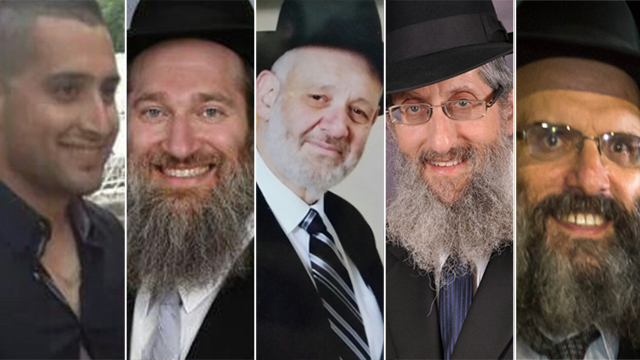
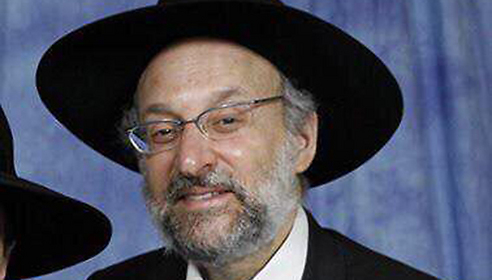
L'chaim with a glass of Cola
Kermaier did keep in touch. Last winter, Rinal and her family went to New York. Kermaier invited her to speak in front of his community. Rinal accepted the inivation and made everyone at the synagogue emotional when she told of the heroism of her husband Zidan, a traffic policeman who rushed to the scene of the attack and managed to stop the massacre of the worshipers at the Kehilat Bnei Torah synagogue, located at the heart of the ultra-Orthodox neighborhood of Har Nof.
At an early morning hour in November 2014, two terrorists from Jabel Mukaber in East Jerusalem infiltrated the synagogue, armed with a gun and a butcher knife. The sounds of gunfire and the screams of the worshipers horrified the neighbors, who quickly called the police. Zidan, who was nearby, driving a traffic police car, heard about the attack on the police scanner and rushed to the scene. He didn't wait for Special Forces, instead he started exchanging fire with the terrorists, without any protective gear, and wounded one of them. By this point, the terrorists have already managed to murder five worshipers, but thanks to Zidan's actions, the life of the other worshipers, and all who live in the area, was saved. The wounded terrorist left the synagogue and advanced on Zidan, firing a bullet that hit the policeman in his forehead. Seif was rushed to the Hadassah Medical Center in Jerusalem's Ein Karem, where doctors fought for his life, but by evening time they had to declare him dead.
Following a police investigation of the incident, which determined it was Seif's determination and bravery that helped save lives, Zidan's family received a Medal of Distinguished Service.
Rinal's talk in front of Rabbi Kermaier's community made the rabbi realize that Zidan's self-sacrifice to save the lives of Jewish worshipers was an opportunity to forge deeper ties between Jews and Druze.
Last summer, Yaakov, Ilana and their four children said goodbye to the skyscrapers of Manhattan and moved to a home on the outskirts of the Arnona neighborhood, where the view from their window is of the soft slopes of the Judean desert and the Dead Sea, gleaming in the distance.
It was during that summer that Kermaier thought of organizing an inter-faith meeting in Israel between Jews and Druze. His neighbors may have raised an eyebrow at the American rabbi, who just arrived and is already seeking to lead a revolution, but Kermaier bounded over the Israeli cynicism with ease.
The meeting was scheduled for Saturday, January 30, when Parashat Yitro (Jethro) was being read at the synagogue. Jethro, a priest of Midian, Moses' father-in-law, helped Moses and advised him on how to lead the Hebrews in the desert, and even joined the Hebrews' journey to Canaan. According to Druze tradition, the Druze are Jethro's descendants and his successors and Jethro, who the Druze call Nabi Shu'ayb, is considered the spiritual founder and chief prophet in the Druze religion.
"When Yaakov suggested the idea of hosting the Druze on Jethro's Shabbat, I told him it was a nice idea, but that I think it'll be hard to convince families with children to come for Shabbat like that," Rinal says.
"Rinal told me about the idea," says her brother, Kinan, 24, who served in IDF Intelligence. "I suggested we tell our parents and hear what they thought. The parents were enthusiastic about it. From there, we started rolling with it, and the one who really took to the idea and drew everyone in was Sheikh Mowafaq Tarif. So we put him in touch with Rabbi Yaakov."
Kermaier and his family went to Julis to visit Sheikh Tarif, the spiritual leader of the Druze in Israel. "The sheikh hosted us in a very moving and dignified way, as the Druze tradition dictates, just like Jethro hosted Moses," Kermaier says. "He was very enthusiastic with the idea of Jews hosting Druze on Jethro's Shabbat. I feel that there are so many common values between us and the Druze. They are our partners in founding and protecting the State of Israel, and it's important that the relationship between us is one of life, and of a true connection."
"I don't think it's right that between the State of Israel and the Druze community there will only be a 'blood covenant.' We need to make a covenant of life," Rinal says. Her hosts agree and raise their glasses in a toast l'chaim. The glasses coming together in friendship are not filled with wine, God forbid, but Cola.
Kermaier made sure all hosts knew that the Druze religion forbids the drinking of alcohol. "It's better that there's no wine on the table at all. For religious Druze, wine on the table is like a religious Jew sitting down to eat and there's pork and lobster on the table."
'I felt like something happened'
After the "l'chaim," everyone feels closer, and Rinal opens up, telling her hosts how she met her sweetheart Zidan, and how her life changed completely one horrible morning a year and a half ago.
"We were introduced by my high school teacher, who is Zidan's uncle. He drove me mad for a few months, telling me I had to meet Zidan, because he's just the one for me. I didn't think so. I was still a student at the time, I wanted to graduate from high school and move on to academic studies. And I didn't like Zidan's age either. He was 26 at the time, it seemed way too old for me. But the teacher wouldn't give up. In the end, I agreed to meet with Zidan, just so my teacher stops bugging me."
The two met at school, with the teacher and another friend supervising, but despite the fact both of them agreed they weren't right for each other, the two started talking on the phone a lot after the meeting. For a year they spoke on the phone, as Zidan was trying to convince Rinal's parents to meet with him. Because of the Druze custom to only marry within the village, Rinal's parents preferred finding her a husband from their village, Kisra-Sumei, which is why they unequivocally refused to meet with Zidan, who lived in the village of Yanuh-Jat. It was only after the school headmaster intervened, and Rinal refused to meet with other guys, that her father agreed, and Zidan was invited to visit the family for Eid al-Adha.
"My father said it was just one visit and that's it, and that I shouldn't live under the illusions of marriage. But when he saw Zidan, and heard how he was talking with such intelligence, he was very impressed with him and immediately agreed for us to marry. Zidan had a very significant presence about him. He was a real manly man, but very gentle and considerate. Anyone who met him was instantly impressed."
The two were married in 2013, before Rinal even turned 20. Zidan, who signed a contract with the Israel Police, kept working in Jerusalem. Because of the long distance, he stayed in Jerusalem for most of the week and returned to their home in Yanuh-Jat on Wednesday or Thursday for a long weekend.
"We took advantage of every minute to be together. Within a year we managed to go abroad twice and twice to Eilat. I told Zidan we still had our whole life ahead of us, but he insisted we went on vacation and spent time together."
That morning, Rinal was on the bus on her way to college in Haifa, where she's studying to become a teacher for preschoolers. At six in the morning, just like every morning, Zidan sent her a text message. At 6:30 she called him and they spoke on the phone. As he always did, Zidan showered her with loving words. "My dear, Rinal, I love you," he told her.
"At 7:02 I felt like something bad was happening to Zidan," Rinal says, as she holds her baby daughter in her arms. "I called him and he didn't answer. I called again and again. Meanwhile, I heard there was a terror attack in Jerusalem. I intentionally didn't go online. I called again and again. I even sent him a message, saying there was a terror attack, so I was asking him to call and tell me he was okay. Usually, Zidan would always answer immediately. But he didn’t this time. I called to remind him that he has a family, that he has a baby he was longing to hear call him 'dad,' but he wasn't thinking about himself or his family, and fought like a lion to save other people's lives."
At that moment, the strong woman breaks, and is no longer giving those around her strong and confident looks. She chokes on her tears as they fall, and the pain bruises.
"After Zidan was killed, we were surrounded with a lot of support - all of our community, and also Jews from Israel and all over the world. My daughter and I were showered with love. Sometimes I felt like it was too much, that I was uncomfortable with receiving so much. I really appreciate you having us here, and this Shabbat. I think it's very nice that the connection was made particularly with religious Jews."
'Feeling at home'
After the personal meetings by the Shabbat table, the hosts and the guests head out for guided tours of the neighborhood, and listen to a lecture from Riad Hamza, one of the senior sheikhs, about Jethro and the customs of the Druze religion.
On Saturday night, after a festive Havdalah ceremony over alcohol-free grape juice, a ceremony is held in honor of Zidan at the girls' Beit Midrash (Jewish study hall) at the Lindenbaum Midrasha. A silver Torah is brought in to the Beit Midrash, and a young boy reads out the relevant quotes from Parashat Yitro.
"Between the Druze and the Jewish people there have been partnership and brotherhood for thousands of years, from the days of Nabi Shu'ayb, the priest of Midian, Moses' father-in-law, as the quotes we just read show," Sheikh Mowafaq Tarif tells the audience. "I am praying that all of the nations in the world can learn from this brave and loving partnership. We were very moved by this Shabbat event and the bond created here. We're already beginning to organize an event to host you. Everything will be kosher, we know how to do that."
At the conclusion of his speech, the sheikh gives Rabbi Kermaier a gift - a beautiful handmade Menorah, carefully crafted from heavy wood.
"There are those in the world pushing towards religious extremism," says Deputy Minister Ayoob Kara, himself a member of the Druze community. "And it is precisely at this time that the moderate religious people should come together and fight together against the haters of peace. The Druze and the Jewish people have special cooperation, which I cannot talk about here, even outside the borders of Israel. This week, the prime minister called me to his office for an urgent consultation about these very issues. Early in the conversation I asked him whether he intentionally called me over for consultation so close to Parashat Yitro, and we both laughed."
"We felt at home in your homes. Thank you for hosting us. You owe us to this very day for the advice Jethro gave Moses on how to lead the people of Israel. After 3,000 years, the interest has grown a lot," joked Sheikh Hassan Gharbawi.
After that, the mood once again becomes serious, as the audience, in tears, watches a video about Zidan Seif. The room falls completely quiet as Rinal makes her way between shawls and tarbooshes, between kippahs and head covers. She speaks in memory of her husband, showing a lot of strength. It's not easy for Rinal, but despite the difficulties, she makes sure to attend every event in honor of her husband.
"Zidan is the first Druze to have a Torah book written in his memory. I attended the unveiling ceremony in Haifa and they even let me write a letter in the book," she whispers to me with pride. "This Shabbat was a special event, and so befitting of Zidan, who brought people together, and gave his life to save others."














